
Searching for treasures? Don’t look too far!
Opublikowano: 21 kwietnia 2016
Poland is still in need of promotion – not only based on its innovative heritage or tourist attractions, but also on traditions, especially the industrial ones, as glass, silver, ceramics and porcelain products from the country are capable of winning the hearts of crafts loving buyers. Moreover, their timeless value earns Poland a great worldwide acclaim.
Traditional market sectors
Many industries in Poland had their ups and downs and their history intertwines with the tumultuous past of our country. There are however areas with long traditions, thanks to which today – supported by modern technologies – we are building our positive image, we are developing our economy and we are making the adjective „Polish” have great connotations. When analysing the national production, one needs to consider four industries which bring Poland particular fame: silver, glass, ceramics and porcelain industries have enormous potential, proven experience emphasized with the knowledge of craft, impressive achievements, and at the same time – are open to market trends and to increasing expectations of their customers.
Ceramics from Bolesławiec
One of the examples of the potential that should be consistently promoted as a Polish asset is the Bolesławiec pottery, popular not only in the mother country, but virtually all around the world – from Europe, through the United States, to Japan and Korea. What is so fascinating about teacups, teapots, plates and bowls which you can mix and match to assemble breakfast, dinner and coffee sets? Above all, it’s the unique style that is the effect of a practice dating back to 1865, when the Reinhold potters began a tradition continued even today, which at the time played an important role in determining the artistic value of the products. After the war, ceramics companies re-initiated their activity basing on decommissioned old factories and production plants, which guaranteed the continuity of making stoneware in the Bolesławiec region. Zakłady Ceramiczne “Bolesławiec”
(“Bolesławiec” Ceramics Plant) established after the World War II – currently the biggest ceramics manufacture in the region – began the renaissance of the traditional Bolesławiec stoneware, a situation that is still ongoing today, with hand-made crockery and decorative objects, orned with stamps and painted with a paintbrush, still attracting interest thanks to their values. Not only artistic values, it should be said, as the Bolesławiec pottery also represents a high utilitarian value – all items can be washed in a dishwasher and used in a microwave, while the objects with specially constructed bottoms are intended for baking in traditional ovens in up to 280°C, as well as for being heated on electric oven tops. What’s more, owing to the lack of harmful substances in the mass used for production and in glaze, the crockery is entirely safe when used for serving food.
Fine porcelain
Porcelain is a sister of ceramics – and if we talk about porcelain, then Ćmielów springs to mind. This year’s 225th anniversary of the factory is really impressive – and so is the range of products which for many years have been present on Polish tables, in the sho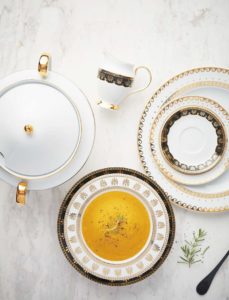 pping bags of tourists who take away a little bit of Poland enclosed in delicate porcelain, or in any place where buyers with sophisticated tastes choose elegance in decor. Polskie Fabryki Porcelany SA (Polish Porcelain Factory) is the biggest producer of high quality thin-walled porcelain in Europe. The products are hand-made here, out of respect to the long tradition of the craft. Decorative techniques are passed on from one generation to another, and they show the skill of the makers. The porcelain from Polish factories is currently represented by 3 brands: “Ćmielów”, “Chodzież” and “Ćmielów Design Studio”. The first one
pping bags of tourists who take away a little bit of Poland enclosed in delicate porcelain, or in any place where buyers with sophisticated tastes choose elegance in decor. Polskie Fabryki Porcelany SA (Polish Porcelain Factory) is the biggest producer of high quality thin-walled porcelain in Europe. The products are hand-made here, out of respect to the long tradition of the craft. Decorative techniques are passed on from one generation to another, and they show the skill of the makers. The porcelain from Polish factories is currently represented by 3 brands: “Ćmielów”, “Chodzież” and “Ćmielów Design Studio”. The first one
offers collections created by the best Polish designers including carefully recreated historic patterns, which have
found homes, among other places, in Polish embassies all around the world, in the Belgian royal family estate, or in Poland’s President’s and Prime Minister’s offices. “Chodzież” includes collections of “democratic porcelain”, which has accompanied Poles at the table for decades. Finally, Ćmielów Design Studio– the youngest brand in Polskie Fabryki Porcelany – supports bold and innovative projects in cooperation with porcelain designers from all around the world and with students of best design schools.
The country by the Vistula – the kingdom of glass
Polish glass factories also impress with their history and heritage, specialising both in industrial glass and artistic glass. They systematically strengthen their brand and build Poland’s good reputation on the international market. In the top artistic glass factories, a great majority of production amounting to 150 thousand tonnes yearly is sold abroad. The wide assortment – starting from table crockery to decorative objects – proves that Polish glass is a high-end product for those who value quality and interesting design.
The tradition from Krosno
For over 90 years, Krośnieńskie Huty Szkła “Krosno” SA (“Krosno” Glass Factory) have been one of the leaders in the industry, showered with awards, and with a great reputation on foreign markets, e.g. in Europe, the USA, Australia, New Zealand, Brazil and Mexico. Since the foundation of the factory in 1920s, the products from Krośnieńskie Huty have been exported to other countries. In the 1970s KHS started mass producing glasses and tumblers that are today highly valued in the world. In 1990 the factory debuted on the stock market as one of only five public companies in Poland, and the following years saw further development of the organisation – Grupa Kapitałowa “Krosno”(“Krosno” Capital Group) was created as a result of a merger of companies from the industry, and an investment in new technologies took the glass production to another level. The pro-development
activity of the glass factory was accompanied with an acquisition of strategic business partners in China, India, South Korea. The popularity of the brand has been generated by the hand-made glass products that are characterised by their immaculate clarity, achieved thanks to the chosen production methods and due to the use of raw materials from trusted suppliers.
Glassworks – genius of design
While the Krosno glass is appreciated for its simplicity and perfect clarity, collections of the Wrześniak Glassworks brand from Tadeusz Wrześniak’s glass factory amaze with the spectrum of forms and colours. Traditional production methods are paired in this case with originality and variety. Hand moulded vases, candle holders, vessels and utilitarian objects combine the quality of making with functionality and attractive patterns, and as a result – they have conquered both national and international markets. The use of the latest technologies and decorative techniques is reflected in the artistic value and durability of the glass masterpieces, which in turn positively influence the company’s competitive position and general opinion about the Polish craft itself. The value of products in Wrześniak Glassworks collections lies in the respect for tradition with simultaneous openness to modern solutions directed at potential buyers who are keen on non-standard interiors decoration. Due to the continuous presence of the company at international fairs, increasing numbers of new customers can give an interior a unique character in accordance with global trends – all thanks to the glass wonders.
Last but not least – silver form HEFRA
When talking about flagship areas of Polish craft, we cannot forget about silver, the processing of which for centuries has been ingrained in the national production. And it is not a reference to just artistic jewellery, beloved by tourists. Already in 1824, a modern, machine-operated Józef Fraget cutlery factory was founded and organized in a way to resemble the greatest and the most innovative establishment in Paris. In 1857 Fraget imported from Austria the only machine in the Polish Kingdom to make 150 dozens of silver cutlery pieces per day. The outcome bewildered with precise encasing, durability, cleanness in making and beautiful shapes. The tradition initiated hundreds’ of years ago has its followers. Fraget’s pre-war factory, after being destroyed
and nationalized, in 1965 was merged with former Henneberg factories to create HEFRA. Today, Fraget and Henneberg Brothers’ most beautiful collections can be seen in museums of Moscow and St Petersburg, and in Poland – in the Royal Castle and the National Museum, as well as in the hands of private collectors. HEFRA is still the only Polish producer of cutlery which is ornamented and engraved by hand. For 190 years HEFRA cutlery – made of silver 925, stainless steel 18-10, plated with silver – has been produced using the same technology. Products of this brand can be found on the tables of elegance and tradition lovers and can also be a perfect gift for people who value sophistication. The company’s offer includes a range of diverse collections, the shared element of
which is their singular character. Product lines such as Rapsodia, Carmen, Toskania, Wenus or Księstwo Warszawskie (Duchy of Warsaw) will let you match the tableware to the interiors and will provide you with the silver cutlery with Polish soul to decorate the dining room.
Author: Małgorzata Szerfer
Tagi: Bolesławiec, ceramics, classic, Cmielow, glass, Glassworks Wrzesniak, Hefra, history, Krosno, luxury, Porcelain, silver, srebro, sztucce, tradition, traditional

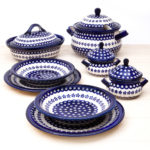
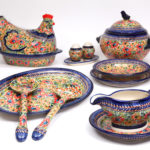





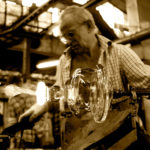
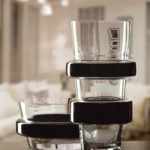

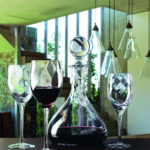
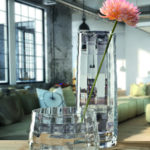
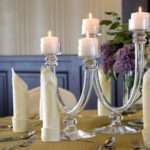
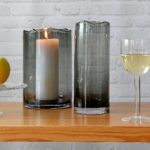



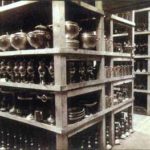




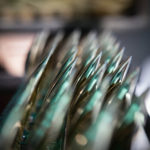


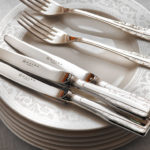
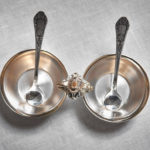
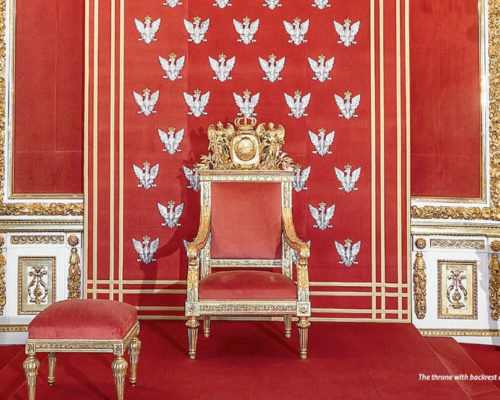



Dodaj komentarz